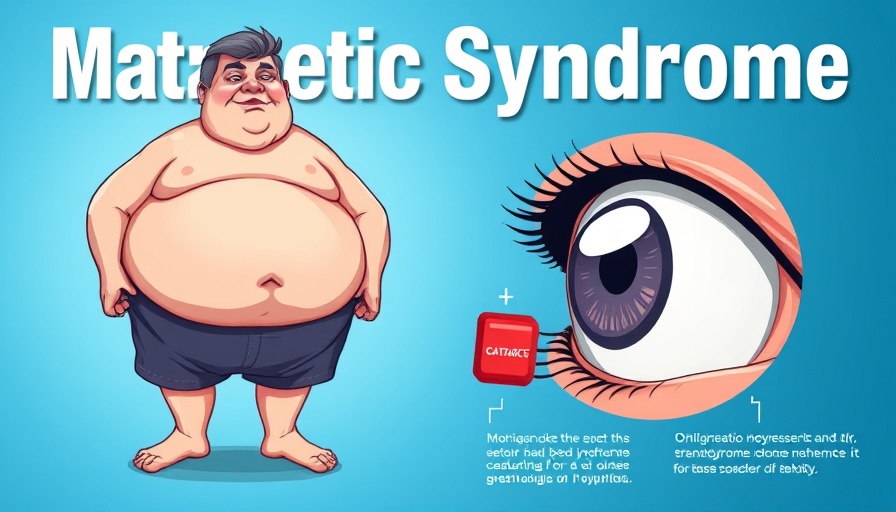
Understanding the Link Between Metabolic Syndrome and Cataracts
Recent research has unveiled a concerning connection between metabolic syndrome and the increased risk of cataracts, particularly in individuals aged 50 and over. Metabolic syndrome comprises a cluster of conditions—elevated blood pressure, high blood sugar, excess body fat around the waist, and abnormal cholesterol or triglyceride levels. These factors can significantly increase one's risk of developing serious health issues, including diabetes and heart disease, but they now also appear to contribute to eye health problems, specifically cataracts.
What Are Cataracts?
Cataracts occur when the lens of the eye becomes cloudy, leading to blurred vision and, if untreated, eventual blindness. Aging is the most common risk factor for cataracts, but recent findings suggest that lifestyle choices and health conditions also play a critical role. The new research highlights the urgent need for awareness and prevention, particularly in populations at higher risk due to metabolic issues.
A Closer Look at Study Findings
The study shows that individuals with metabolic syndrome are significantly more likely to develop cataracts compared to those without this syndrome. In older adults, this association is particularly evident. The data reveals that around 50% of individuals over 50 with metabolic syndrome showed signs of cataract development during the study period, highlighting an alarming trend that warrants further investigation.
How Does Metabolic Syndrome Affect Eye Health?
The mechanisms behind this increased risk can be complex. Elevated glucose levels associated with metabolic syndrome may lead to the formation of advanced glycation end-products (AGEs), which can damage lens proteins, promoting cataract formation. Additionally, chronic inflammation linked to metabolic syndrome could also contribute to oxidative stress in the eyes, further exacerbating the risk.
Context and Comparison: A Growing Concern
Globally, cataracts remain a leading cause of blindness, making this research highly relevant. Current trends suggest that more individuals are experiencing signs of metabolic syndrome due to sedentary lifestyles, poor diets, and other lifestyle factors. This correlation raises concerns for public health officials, particularly given the aging population in many countries.
Future Predictions: Implications for the Aging Population
As our society ages, the implications of these findings could be profound. If current trends continue, healthcare systems may face increased burdens from both cataracts and metabolic syndrome. By understanding and acting on these risk factors, future health campaigns can better address eye health, introducing early intervention and education about the importance of managing metabolic syndrome through lifestyle changes.
Counterarguments and Diverse Perspectives
While the study emphasizes the correlation between metabolic syndrome and cataract risk, it remains essential to consider alternative views. Some experts argue that the direct causative link between metabolic syndrome and cataracts is still unclear and warranting more comprehensive research. Additionally, individual genetic predispositions and environmental factors often contribute to eye health.
Prevention Measures: Taking Action
Improving awareness of the relationship between metabolic syndrome and eye health is vital. For those over 50, maintaining a healthy lifestyle—exercising regularly, eating a balanced diet low in sugars and fats, and managing medical conditions—can significantly reduce the risk of developing both metabolic syndrome and cataracts. Routine eye exams and proactive health management should be emphasized in healthcare conversations.
Emotional and Human Interest Angle
Understanding the risks associated with metabolic syndrome and cataracts can evoke a sense of urgency among individuals, especially as they approach or surpass the age threshold of 50. Many may feel overwhelmed by the health decisions they need to make, but having the right information empowers them to take control of their wellbeing. Personal stories of triumph in managing eye health can serve as motivational case studies.
Summary: Eye Health Matters
As research continues to unfold, attention to the connections between metabolic syndrome and an increased risk of cataracts becomes critical. Individuals must prioritize regular health checks and eye exams, particularly as they age. The changes made today can significantly impact future generations, ensuring better vision and overall health.
In light of these findings, if you are over 50 or are at risk for metabolic syndrome, it's vital to discuss your health proactively with your healthcare provider. Staying informed can be the first step towards safeguarding your vision.
 Add Row
Add Row  Add
Add 




Write A Comment